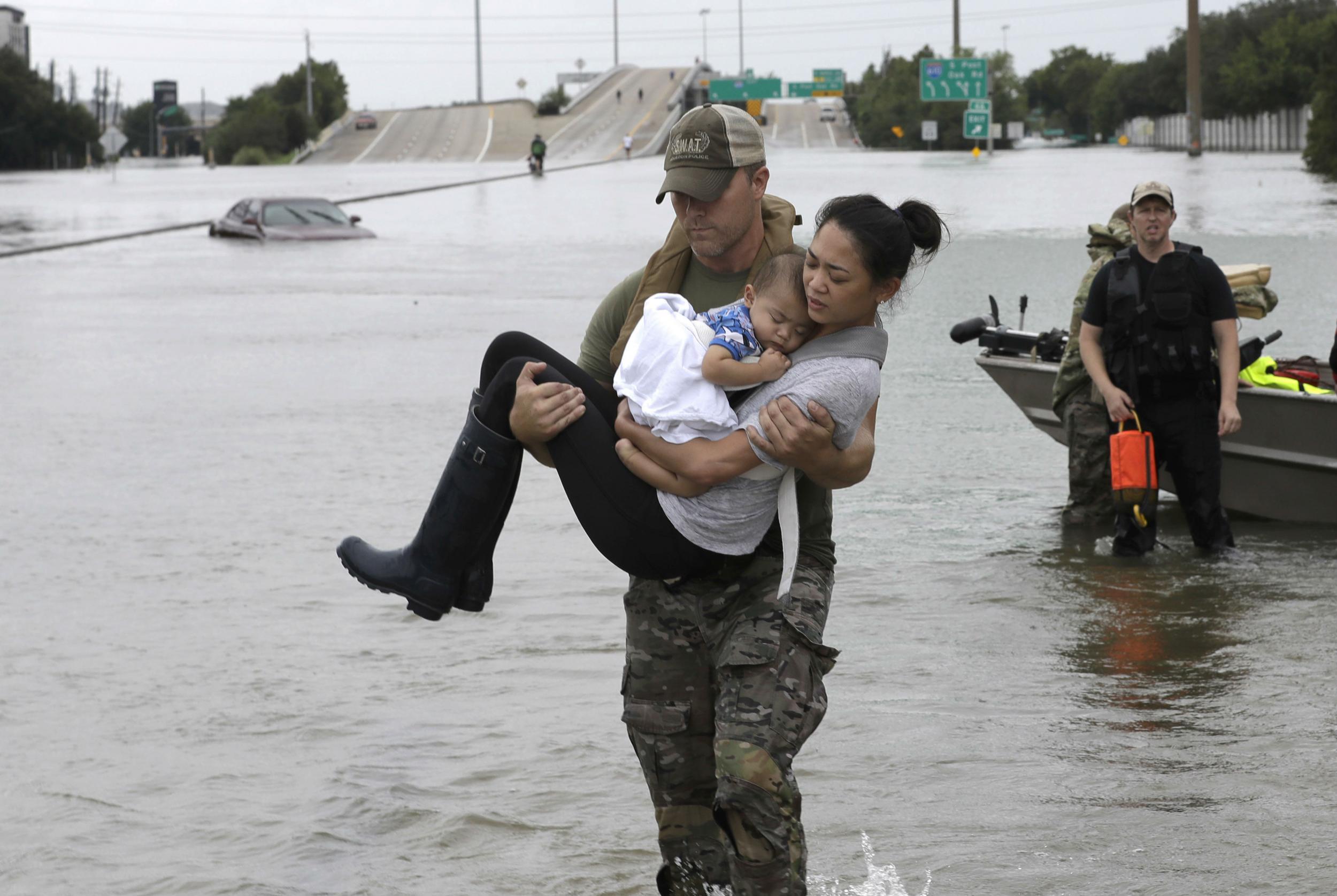Houston was ready for the storm and the police were heroic. That's one reason why Harvey is not Katrina
Public servants and members of the public worked together to help those in need

There are frequently heroes when Mother Nature turns people’s lives upside down.
For every story of isolated looting, there are many more of neighbours helping each other, or of people setting out to rescue others using a kayak or a float. For every report of official indifference, there are many more of public servants working red-eyed and around-the-clock, of trying to save their city. Some, literally, give their lives.
Steve Perez, a 60-year-old sergeant with the Houston Police Department, sits in that last category. He had left his home at around 4am on Tuesday, determined to take part in a rescue shift and found himself trapped in floodwaters he was hoping to save others from.

His wife and father-in-law had urged him not to go to work that morning. It was so dangerous out there, they said. His response, according to Houston Police Chief Art Acevedo, was that “he had work to do”. He spent two and half hours trying to find a route to his station through the darkened, flooded streets, before his vehicle was engulfed.
“He laid down his life,” said Acevedo, struggling to hold back tears. “He was a sweet, gentle public servant.”
Twelve years ago, some police officers in New Orleans, a force beset by corruption and inefficiency, shamed their badges after the city was struck by Hurricane Katrina. Around 1,250 residents would ultimately die.
While some officers responded to the call of duty with heroism that matched that of Perez, others either failed to show up to work, or else behaved in a disgraceful way – turning back African Americans trying to escape from the suburb of Greta, shooting “looters” who were frequently just lost, and then covering up their crimes.
Harvey is different to Katrina. To start with, Houston, America’s fourth-largest city, was not not struck by the 130mph winds of a category four hurricane, or a storm surge that followed. But it has been hit by record rainfall and flooding, more so than even New Orleans.
A crucial difference is that the Texan city, which gave shelter to so many refugees from Katrina, seemed much more prepared. While many in New Orleans appeared to effect a shrug; residents had been warned about so many previous storms bearing down on them that eventually veered away at the last moment, that there was a sense of complacency.
Very late in the day – much too late, in truth – city authorities under Ray Nagin tried to enact a forced evacuation for those who had declined to leave, or else did not have the means to do so. Their solution was the Superdome: the sports ground used by the the New Orleans Saints American Football team.
The building was not built to handle a storm, was insufficiently stocked with food, water or lavatories, and had no or very little security. People in there were effectively left to themselves. The stories of horror and hardship that seeped out of the Superdome in the days that followed have entered the national consciousness.
In Houston, there was a plan, and a decision taken that people should stay in their homes, rather than take to the streets and try and flee a hurricane that could have struck anywhere. Police from Houston and the surrounding counties then worked together to be ready, as the rain and flooding they knew was coming finally hit.
Hundreds of emergency responders set about rescuing people stranded in their homes – more than 6,000 in all. Others drove vehicles to drop people off at the rescue centres that had long been designated and prepared for.
Murder detectives turned out to join the rescue effort, meaning traffic officers with flashing lights were able to be positioned at points on the city’s freeways that were flooded, or led to roads that were. This basic coordination of traffic must have saved dozens of lives.
The authorities also had the support of countless numbers of volunteers – from inside the city – and from places as far afield as Arkansas and Louisiana. Ordinary people did their bit by turning out to work at hotels that housed the stranded, or fuel stations and grocery stores – seemingly small contributions, but crucial to letting life continue as normally as possible.
Also crucially, Houston has not been abandoned by the federal government, as was the case of New Orleans, which President George Bush flew over in Air Force One and stared sternly at from the window, but which he did little else to help.
Carl Manning, a spokesman for the American Red Cross who were among officials at the George R Brown Convention Centre in Houston (the main emergency shelter) told The Independent that after every natural disaster, officials sat down to examine what had worked well in the emergency response, and what had not.
“We learned a lot from Katrina. Every disaster you learn from – how to do things better,” he said.
Houston is still dealing with Harvey. People are still being rescued, residents are still wondering whether their home will be next to be flooded. It is possible that for many – those whose homes have been ruined, those who have lost loved ones – things will get considerably worse before they get better.
The death toll from Harvey is currently around 30. It could yet rise, as officials finally get to those most remote areas that were hit by the storm.
Yet it is a certainty that the death toll would already be much higher, if not for the efforts of emergency responders and volunteers, who put everything on the line when a calamity descended. People such as Sgt Steve Perez.
Join our commenting forum
Join thought-provoking conversations, follow other Independent readers and see their replies
Comments